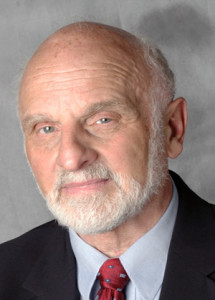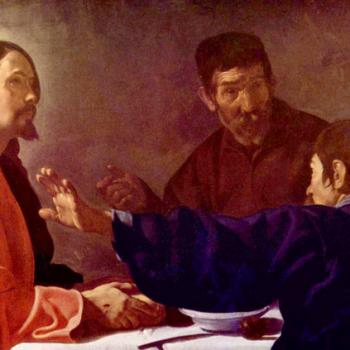Back when I was a good Presbyterian I memorized the Westminster Shorter Catechism.
Even non-Presbyies may have gotten a little taste of this by the hand of John Piper. Its first question and answer reads, “What is the chief end of man?” “Man’s chief end is to glorify God and enjoy him forever.” Piper suggested we understand “and enjoy him” as “by enjoying him.” God wants a people who delight in God.
A few questions later the Catechism asks what I take to be a fateful question with an equally fateful answer. Question and Answer 4 goes like this:
“What is God?”
“God is a spirit; infinite, eternal, and unchangeable in his being, wisdom, power, holiness, justice, goodness, and truth.”
The decision to ask “What is God?” rather than “Who is God?” sets us up for a description of the god of the philosophers rather the God of the Christian story. To assert the core identity of God as infinity, eternality, and unchangeability is to describe a God who can in no meaningful sense be in a relationship with humanity.
It is no wonder that the Catechism describes the content of scripture like this: “The scriptures principally teach what man is to believe concerning God and what duty God requires of man.”
The God described in Q/A 4 can only a God who sits in heaven distributing doctrine to believe and rules to follow. That God could never play the part of God as scripted by the story of the Bible we actually have.
I say all this not simply to pick on the Westminster Catechism, but to pick on the Christian theological tradition more broadly. Our understanding of what we mean when we say “god” is too often shaped by abstractions such as “omniscient,” “omnipresent,” and “omnipotent,” rather than by the story and relationships by which God has chosen to be known as a particular God who has done particular things.
The Strange God of Fidelity
Walter Brueggemann gave a talk last week as part of the Enfolding Theology Conference’s pre-conference video calls about the problem of God. In his presentation he calls the biblical God “the strange God of fidelity.
I, for one, am not sure which is stranger: that God has chosen to be known as the one who is faithful, and can be held accountable to being faithful to the people with whom God is in covenant, or that we would find such a God to be strange at all.
Because this “strange” God is the God whom we meet on ever page of scripture. This is the God who has chosen to be known not as an abstraction but as someone embedded with a particular people, and to be vulnerable and even open to change for the sake of the world.
Brueggemann reminds us that God is a real character. In this story, God actually acts. God acts, sends, delivers. God is intimately involved here.
And, God is capable of a full range of emotions. The idea of an impassible God is not the God of the Bible. The Bible’s God is full of love and mercy and is capable of anger and hate and even violence.
Now, perhaps, we start to see why it is so important that God be a God of fidelity: this is a God whose affection can be truly life-giving. And it is a God whose opposition can be deadly in every way. When God makes covenant, God is creating a relationship that God will fight for. And, God is creating a people who have a right to demand certain actions of God.
But all of this is contested. Because God is a real character in relationship with other real characters. There is no simple “given” about the outcome of this relationship, because real relationships don’t work that way.
This thing that we love to talk about so much, about having a relationship with God, is a dangerous thing. It is dangerous because it demands something of humanity. And it is dangerous because it means that God will be changing as well. Nobody is in a real relationship and remains unchanged by it.
The God of the Bible?
Acknowledging such a God has tremendous implications for what we look for and therefore what we see when we come to the Biblical text. In a real relationship, each party might initiate movement.
Brueggemann turns to the Exodus story to show that it is all begun, not by God’s remembering Israel, but by Israel crying out to God. Then God hears. Then God remembers. Then God comes down.
There is a dignity to human participation in this story, as humanity is honored with a real relationship to God. And there is a danger in it as well, the danger that at any given moment we have to see if the God who has promised fidelity will, in fact, make good on it.
Brueggemann also knows that the Bible is not univocal in its presentation of God. There are attempts to escape the dangers entailed in throwing ourselves wholly on the fidelity of a real, seemingly unpredictable character. They are met with certain attempts to control this character and create an artificial fidelity through sacrifice, for instance. But sacrifice is never enough for this God who continues to call for mercy and justice.
The God of Jesus
If the biblical God is a God of fidelity, then the whole biblical story should be readable as a story in which faithfulness is the contested question: can a people in exile claim, and will they finally see, that God is faithful? Can God ever have a human people who exhibit fidelity on their end of the relationship? If they get it right, will the fortunes of the people finally change?
These are the questions that not only haunt Israel in the wilderness and conquest, in the time of the judges and kings, in the exodus and after their return. These are the questions that make intelligible the Jesus story.
The Jesus story claims to be the affirmative answer to the question, Can God’s people ever exhibit the fidelity that God demands? And the tension in the narrative reaches its fever pitch when Jesus and the characters around him and we the reader see God’s apparent infidelity.
“My God, my God, why have you forsaken me?” That’s the cry of God’s king. It’s God’s faithful king. The first to be wholly faithful to the covenant, to live in complete integrity as God’s anointed. It’s his cry when God has not delivered the from his enemies. God has not played God’s part. God has left him.
At last, there is a faithful human. Where, then, is God? Strange fidelity, indeed.
In the end of the story, human fidelity is met with divine fidelity. The God who has been deeply affected once again hears and remembers and comes down to deliver.
And so our question, “Who is God?” starts to get is critical answer. This God, this particular God, is not only the God of Abraham, Isaac, and Jacob. This is the God and Father of our Lord Jesus Christ. This is the God who gives life to the dead and calls into being what does not exist.
This is not a God who could ever be known in abstractions. This is a God who can only be known in particulars. Especially through being faithful to a people, and to the Human One most of all.
It is the story that shows us a God worth worshipping. Not a remote God dispensing doctrine and rules. But a God who along with us bears the dangers of being in relationship, including the possibility of taking on human finitude and temporality and of being eternally changed.
If you can’t get enough God talk, the Hatchery in LA is where you want to be next week (or, watch online). Their Enfolding Theology Conference is all about the “problem” of God. Use the code DanielKirk when you register to get 10% off













